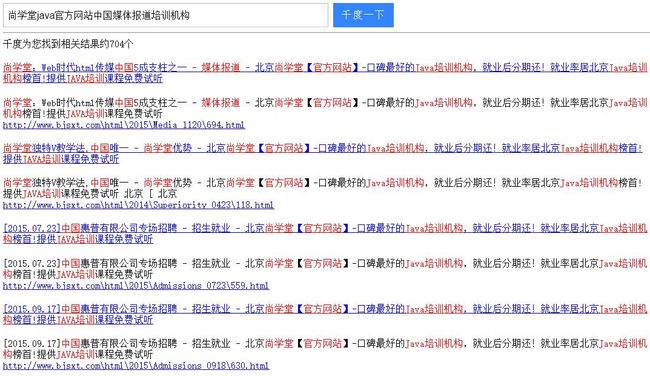3、使用Lucene实现千度搜索
1、新建Web项目
新建一个Web项目,我命名为SearchEngine,然后导入Java包:
除了上篇博客中的Jar包外,我还引入了 IKAnalyzer2012_FF.jar 包和struts2的相关包:
IKAnalyzer:是用来进行中文分词的一个jar包,他会把中文分词一个个合理的词来进行检索;
Struts2:一会儿搜索结果,使用Struts2展示到浏览器中;
2.准备数据源
我使用linux 命令 wget 爬了一个网站内的一部分html网页,同样将它放在一个纯英文的目录:
3、创建索引
新建一个类CreateIndex:
import java.io.File; import java.io.IOException; import java.util.Collection; import org.apache.commons.io.FileUtils; import org.apache.commons.io.filefilter.TrueFileFilter; import org.apache.lucene.document.Document; import org.apache.lucene.document.Field.Store; import org.apache.lucene.document.TextField; import org.apache.lucene.index.IndexWriter; import org.apache.lucene.index.IndexWriterConfig; import org.apache.lucene.index.IndexWriterConfig.OpenMode; import org.apache.lucene.store.FSDirectory; import org.apache.lucene.util.Version; import org.junit.Test; import org.wltea.analyzer.lucene.IKAnalyzer; import com.HtmlBeanUtil; import com.model.HtmlBean; public class CreateIndex { public static final String DATA_DIR="E:/data/engine/www.bjsxt.com"; public static final String INDEX_DIR="E:/data/engine/index"; public void createIndex() throws IOException{ FSDirectory dir = FSDirectory.open(new File(INDEX_DIR)); // 使用中文分词的jar包进行分词 IKAnalyzer analyzer = new IKAnalyzer(true); IndexWriterConfig config = new IndexWriterConfig(Version.LUCENE_4_9, analyzer); config.setOpenMode(OpenMode.CREATE_OR_APPEND); IndexWriter writer = new IndexWriter(dir, config); File file = new File(DATA_DIR); Collection<File> files = FileUtils.listFiles(file, TrueFileFilter.INSTANCE, TrueFileFilter.INSTANCE); for(File f : files){ // 将原数据源内的内容通过抓取,返回一个实体类方便存储 HtmlBean hb = HtmlBeanUtil.parseHtml(f); if(hb!=null && hb.getTitle()!=null && !hb.getTitle().trim().equals("")){ Document doc = new Document(); // 存储三个内容,标题,内容,url (实际上内容可能会更多比如关键字,描述等) doc.add(new TextField("title",hb.getTitle(), Store.YES)); doc.add(new TextField("content",hb.getContent(), Store.YES)); doc.add(new TextField("url",hb.getUrl(), Store.YES)); writer.addDocument(doc); } } writer.close(); } }
实体HtmlBean和HtmlBeanUtil:
public class HtmlBean { private String title; private String content; private String url; public String getTitle() { return title; } public void setTitle(String title) { this.title = title; } public String getContent() { return content; } public void setContent(String content) { this.content = content; } public String getUrl() { return url; } public void setUrl(String url) { this.url = url; } }
import java.io.File; import java.io.IOException; import net.htmlparser.jericho.Element; import net.htmlparser.jericho.HTMLElementName; import net.htmlparser.jericho.Source; import com.model.HtmlBean; public class HtmlBeanUtil { public static HtmlBean parseHtml(File file){ try { Source source = new Source(file); Element title = source.getFirstElement(HTMLElementName.TITLE); String content = source.getTextExtractor().toString(); HtmlBean hb = new HtmlBean(); if(title==null || title.getTextExtractor() == null){ return null; } hb.setTitle(title.getTextExtractor().toString()); hb.setContent(content); String path = file.getAbsolutePath(); String url = "http://"+path.substring(15); url = url.replace("\\", "/"); hb.setUrl("http://"+path.substring(15)); return hb; } catch (IOException e) { e.printStackTrace(); } return null; } }
使用单元测试跑一下创建索引的方法,最后会得到这么几个索引数据库文件:
4、创建检索类SearchIndex:
import java.io.File; import java.io.IOException; import java.util.ArrayList; import java.util.List; import org.apache.lucene.analysis.Analyzer; import org.apache.lucene.document.Document; import org.apache.lucene.index.DirectoryReader; import org.apache.lucene.index.IndexReader; import org.apache.lucene.queryparser.classic.ParseException; import org.apache.lucene.queryparser.classic.QueryParser; import org.apache.lucene.search.IndexSearcher; import org.apache.lucene.search.Query; import org.apache.lucene.search.ScoreDoc; import org.apache.lucene.search.TopDocs; import org.apache.lucene.search.TopScoreDocCollector; import org.apache.lucene.search.highlight.Highlighter; import org.apache.lucene.search.highlight.InvalidTokenOffsetsException; import org.apache.lucene.search.highlight.QueryScorer; import org.apache.lucene.search.highlight.SimpleHTMLFormatter; import org.apache.lucene.store.Directory; import org.apache.lucene.store.FSDirectory; import org.apache.lucene.util.Version; import org.wltea.analyzer.lucene.IKAnalyzer; import com.model.HtmlBean; import com.model.Page; public class SearchIndex { public Page search(String keyWord,int pageNum,int pageSize) throws IOException, ParseException, InvalidTokenOffsetsException{ Directory dir = FSDirectory.open(new File(CreateIndex.INDEX_DIR)); IndexReader reader = DirectoryReader.open(dir); IndexSearcher searcher = new IndexSearcher(reader); // 使用中文分词器把用户输入的内容进行分词 Analyzer analyzer = new IKAnalyzer(true); QueryParser parser = new QueryParser(Version.LUCENE_4_9, "title", analyzer); Query query = parser.parse(keyWord); //format 用来制定要高亮显示的词的样式 SimpleHTMLFormatter format = new SimpleHTMLFormatter("<font color='red'>","</font>"); Highlighter high = new Highlighter(format ,new QueryScorer(query)); // pageNum*pageSize 控制显示的最大条数 TopScoreDocCollector results = TopScoreDocCollector.create(pageNum*pageSize, false); searcher.search(query, results); // 检索出来想要的结果的条数,可以实现分页 TopDocs topDocs = results.topDocs((pageNum-1)*pageSize, pageNum*pageSize); Page page = new Page(); page.setPageNum(pageNum); page.setPageSize(pageSize); page.setTotalCount(topDocs.totalHits); ScoreDoc[] docs = topDocs.scoreDocs; List<HtmlBean> list = new ArrayList<HtmlBean>(); for(ScoreDoc scoreDoc : docs){ Document document = reader.document(scoreDoc.doc); String title = document.get("title"); String content = document.get("content"); String url = document.get("url"); //获取到检索的结果以后,可以使用Highlighter获取高亮效果 title = high.getBestFragment(analyzer, "title", title); content = high.getBestFragment(analyzer, "content", content); HtmlBean hb = new HtmlBean(); hb.setTitle(title); hb.setContent(content); hb.setUrl(url); list.add(hb); } // 计算记录的总页数 if(page.getTotalCount() <= pageSize){ page.setTotalPageCount(1); }else{ if(page.getTotalCount() % pageNum == 0){ page.setTotalPageCount(page.getTotalCount() / pageSize); }else{ page.setTotalPageCount(page.getTotalCount() / pageSize + 1); } } page.setList(list); return page; } }
同时我还用到了一个Page的实体,用来存放并返回查到的结果:
import java.util.List; public class Page { private long totalCount; private int pageSize; private int pageNum; private long totalPageCount; private List<HtmlBean> list; public long getTotalCount() { return totalCount; } public void setTotalCount(long totalCount) { this.totalCount = totalCount; } public int getPageSize() { return pageSize; } public void setPageSize(int pageSize) { this.pageSize = pageSize; } public int getPageNum() { return pageNum; } public void setPageNum(int pageNum) { this.pageNum = pageNum; } public List<HtmlBean> getList() { return list; } public void setList(List<HtmlBean> list) { this.list = list; } public long getTotalPageCount() { return totalPageCount; } public void setTotalPageCount(long totalPageCount) { this.totalPageCount = totalPageCount; } }
5、页面呈现内容
页面呈现内容,由于过于简单就不描述太多了;
Struts.xml和web.xml
<?xml version="1.0" encoding="UTF-8" ?> <!DOCTYPE struts PUBLIC "-//Apache Software Foundation//DTD Struts Configuration 2.1//EN" "http://struts.apache.org/dtds/struts-2.1.dtd"> <struts> <constant name="struts.118n.encoding" value="UTF-8"></constant> <constant name="struts.action.extension" value="do"></constant> <package name="pages" namespace="/pages" extends="struts-default"> <action name="engine_*" class="com.actions.SearchEngineAction" method="{1}"> <result name="message">/WEB-INF/message.jsp</result> <result name="index">/index.jsp</result> </action> </package> </struts>
<?xml version="1.0" encoding="UTF-8"?> <web-app xmlns:xsi="http://www.w3.org/2001/XMLSchema-instance" xmlns="http://java.sun.com/xml/ns/javaee" xsi:schemaLocation="http://java.sun.com/xml/ns/javaee http://java.sun.com/xml/ns/javaee/web-app_3_0.xsd" id="WebApp_ID" version="3.0"> <filter> <filter-name>struts2</filter-name> <filter-class>org.apache.struts2.dispatcher.ng.filter.StrutsPrepareAndExecuteFilter</filter-class> </filter> <filter-mapping> <filter-name>struts2</filter-name> <url-pattern>/*</url-pattern> </filter-mapping> <display-name>SearchEngine</display-name> <welcome-file-list> <welcome-file>index.html</welcome-file> <welcome-file>index.htm</welcome-file> <welcome-file>index.jsp</welcome-file> <welcome-file>default.html</welcome-file> <welcome-file>default.htm</welcome-file> <welcome-file>default.jsp</welcome-file> </welcome-file-list> </web-app>
Action:
import java.io.File; import java.io.IOException; import javax.servlet.http.HttpServletRequest; import org.apache.lucene.queryparser.classic.ParseException; import org.apache.lucene.search.highlight.InvalidTokenOffsetsException; import org.apache.struts2.ServletActionContext; import com.lucene.CreateIndex; import com.lucene.SearchIndex; import com.model.Page; public class SearchEngineAction { private int pageNum; private String keyword; public String create(){ HttpServletRequest request = ServletActionContext.getRequest(); try { File file = new File(CreateIndex.INDEX_DIR); if(file.exists()){ for(File f : file.listFiles()){ f.delete(); } file.delete(); file.mkdirs(); } CreateIndex createIndex = new CreateIndex(); createIndex.createIndex(); request.setAttribute("message", "创建索引完成..."); } catch (Exception e) { e.printStackTrace(); request.setAttribute("message", e.getMessage()); } return "message"; } public String search() throws IOException, ParseException, InvalidTokenOffsetsException{ HttpServletRequest request = ServletActionContext.getRequest(); int pageSize = 10; if(pageNum < 1){ setPageNum(1); } if(keyword!=null && !keyword.trim().equals("")){ SearchIndex search = new SearchIndex(); Page page = search.search(keyword, pageNum, pageSize); request.setAttribute("page", page); request.setAttribute("keyword", keyword); } return "index"; } public int getPageNum() { return pageNum; } public void setPageNum(int pageNum) { this.pageNum = pageNum; } public String getKeyword() { return keyword; } public void setKeyword(String keyword) { this.keyword = keyword; } }
页面展示:
<html> <head> <meta http-equiv="Content-Type" content="text/html; charset=UTF-8"> <title>千度一下,你就知道</title> <style type="text/css"> body{padding-left: 132px;padding-right: 132px;} #keyword{width: 521px; height: 20px; padding: 9px 7px;font: 16px arial; border: 1px solid #b8b8b8; border-bottom: 1px solid #ccc; vertical-align: top; outline: none; box-shadow: none;} .s_btn { width: 100px; height: 40px; color: white; border: solid 1px #3385ff; font-size:13pt; letter-spacing: 1px;background: #3385ff; border-bottom: 1px solid #2d78f4;outline: medium; -webkit-appearance: none; -webkit-border-radius: 0;} h4{ font-weight: normal;} </style> </head> <body> <form action="/SearchEngine/pages/engine_search.do" method="post"> <di> <input name="keyword" id="keyword" type="text" maxlength="100" autocomplete="off" value="${keyword }" /> <input type="submit" class="s_btn" value="千度一下" /> </div> <hr /> <c:if test="${page != null }" > <div>千度为您找到相关结果约${page.totalCount}个</div> <c:forEach items="${page.list }" var="record"> <h4><a href="${record.url }" target="_black">${record.title }</a></h4> <p>${record.content } <br /> <a href="${record.url }" target="_black">${record.url }</a> </p> </c:forEach> <div> <c:forEach var="i" begin="1" end="${page.totalPageCount }" step="1"> <a> ${i} </a> </c:forEach> </div> </c:if> </form> </body> </html>
运行一下看一下效果:
没有搜索的时候:
我们搜索一个比较复杂的词:“尚学堂java官方网站中国媒体报道培训机构” 这些词都是完全合在一起的,看看中文分词器能否给分出来:
完全可以,把能够组合的词全显示出来了;
说明:在该DEMO中,我爬了尚学堂的网站,但这里没有要给他们打广告的意思哦!纯粹感觉好玩!
关键Lucene 根据权重检索,其中有一个算法是TF-IDF算法,详细可查看这篇文章:
http://www.cnblogs.com/biyeymyhjob/archive/2012/07/17/2595249.html
小结:在该文中做了一个史上最简陋的搜索引擎,但Lucene的强大是显而已见的,搜索速度也非常快;该小Demo还有很多功能需要补全,比如分页,比如按权重搜索等等等等等...有感兴趣的伙伴可以试着补充全一下,让千度搜索比百度搜索更NB(在梦中YY); 有需要源码的小伙伴,给我发邮件吧:[email protected]




